同义句转换
同义句转换口诀顺口溜
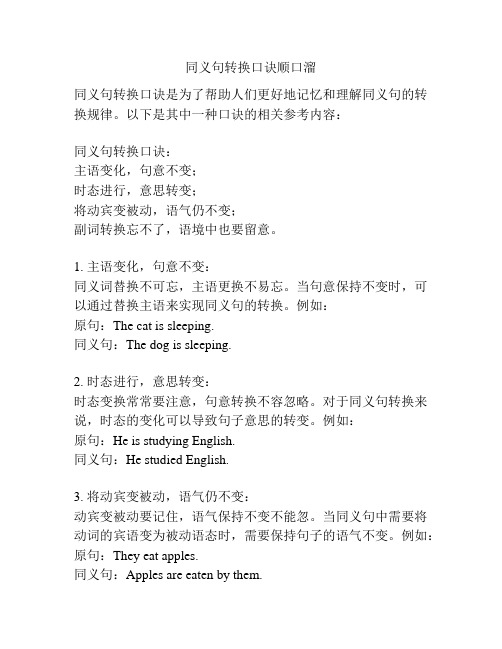
同义句转换口诀顺口溜同义句转换口诀是为了帮助人们更好地记忆和理解同义句的转换规律。
以下是其中一种口诀的相关参考内容:同义句转换口诀:主语变化,句意不变;时态进行,意思转变;将动宾变被动,语气仍不变;副词转换忘不了,语境中也要留意。
1. 主语变化,句意不变:同义词替换不可忘,主语更换不易忘。
当句意保持不变时,可以通过替换主语来实现同义句的转换。
例如:原句:The cat is sleeping.同义句:The dog is sleeping.2. 时态进行,意思转变:时态变换常常要注意,句意转换不容忽略。
对于同义句转换来说,时态的变化可以导致句子意思的转变。
例如:原句:He is studying English.同义句:He studied English.3. 将动宾变被动,语气仍不变:动宾变被动要记住,语气保持不变不能忽。
当同义句中需要将动词的宾语变为被动语态时,需要保持句子的语气不变。
例如:原句:They eat apples.同义句:Apples are eaten by them.4. 副词转换忘不了,语境中也要留意:副词转换要牢记,语境中变化也要留。
副词在同义句转换中起到了很重要的作用,不仅需要了解同义替换的词汇,还需要根据句子的语境进行转换。
例如:原句:She speaks English fluently.同义句:She speaks English skillfully.通过以上的参考内容,我们可以总结出一种较为简单的同义句转换口诀。
通过记住这个口诀,人们可以更好地理解和应用同义句转换规律,帮助提高句子的表达能力。
同义句转换口诀顺口溜

同义句转换口诀顺口溜同义句转换是英语学习中非常重要的一项技能,它可以帮助我们更好地理解和运用词汇和语法结构。
为了帮助大家更好地掌握同义句转换的技巧,我特地整理了一个有趣的口诀顺口溜,希望能够帮助大家记忆和运用。
口诀顺口溜如下:A的同位语,转同义句,前后意思不变化。
主语宾语互换位,变回原来人事物。
以谓语加逻辑,转同义句无难题。
从句转名词用it,转换没烦恼。
把主动改被动,加by不能遗漏。
把被动改主动,动词要加to。
有时态转时态,助动词一定要。
本应否定改肯定,要加助动词do。
肯定做否定,助动词变not。
把状语提到句首,意思不变化。
同义句转变形,容易又快捷。
这个口诀顺口溜总结了同义句转换中常见的技巧和规律,下面我将用一些具体的例子来解释和应用这些技巧。
首先是第一句口诀:“A的同位语,转同义句,前后意思不变化。
”这句话的意思是,当一个句子中有一个名词A,它的同位语是另一个名词B,我们可以通过换种表达方式来实现同义句的转换。
比如原句是"The cat, my pet, is very cute.",我们可以将同位语"My pet"放到句子前面:"My pet, the cat, is very cute.",这两个句子的意思是一样的。
接下来是第三句口诀:“以谓语加逻辑,转同义句无难题。
”这句话的意思是,当一个句子中的谓语动词后面有逻辑补充信息时,我们可以通过改变这个逻辑信息的表达方式来转换同义句。
比如原句是"He ran to the store.",我们可以改为"He went to the store.",这两个句子的意思是一样的。
然后是第五句口诀:“把主动改被动,加by不能遗漏。
”这句话的意思是,当一个句子中的动作是由主语进行的,并且我们想将主语改为被动结构时,需要在谓语动词前加上"by"来表示动作的执行者。
英语同义句转换

英语同义句转换
英语同义句转换的方法:
所谓同义句转换就是将一个句子用另一种形式表达出来,而且意思不变。
用具有相同意思的词或词组进行转换。
例:She has a good time in Wuhan.她在武汉玩得很开心。
转换:She enjoys herself in Wuhan.她在武汉玩得很开心。
例:He spends some money on books every week.他每周都花一些钱买书。
转换:He pays some money to buy books every week.他每周花一些钱买书。
借助于反义词或反义词组进行转换。
例:l can't run as fast as my brother.我不能和我哥哥跑得一样快。
转换:l run more slowly than my brother.我跑得比我哥哥慢。
My brother runs faster than l.我哥哥跑得比我快。
例:He is not old enough to go to school.他还没到上学的年龄。
转换:He is too young to go to school.他太小了,不能去上学。
词语的理解和运用
这里是指:由于词性不同,但所表达的意思相同的句型变换。
例:We often go to school on foot.我们经常步行去上学。
转换:We often walk to school.我们经常步行去学校。
四年级下册英语五单元同义句转换的方法举例

四年级下册英语五单元同义句转换的方法举例
当转换同义句时,可以采取以下几种方法:
1. 词语替换:替换原句中的词语或短语,保持句子的意思不变。
例句:She is reading a book.(她正在读一本书。
)
同义句:She is looking at a book.(她正在看一本书。
)
2. 结构改变:改变句子的结构,但保持句子的意思不变。
例句:He always goes to school on foot.(他总是步行去学校。
)
同义句:On foot, he always goes to school.(步行,他总是去学校。
)
3. 变换句式:将原句改写成其他句式,保持句子的意思不变。
例句:They have finished their homework.(他们已经完成作业。
)
同义句:Their homework is done.(他们的作业已完成。
)
请注意,以上只是同义句转换的一些方法举例,并不代表全部。
具体应根据原句的意思和语境进行转换。
高一英语同义句转换知识点
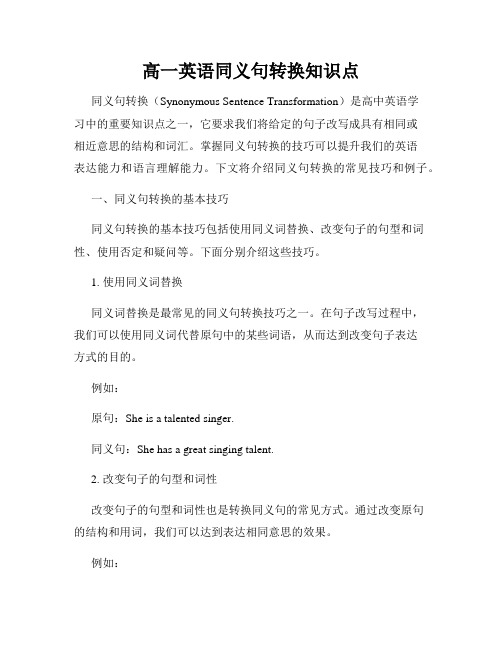
高一英语同义句转换知识点同义句转换(Synonymous Sentence Transformation)是高中英语学习中的重要知识点之一,它要求我们将给定的句子改写成具有相同或相近意思的结构和词汇。
掌握同义句转换的技巧可以提升我们的英语表达能力和语言理解能力。
下文将介绍同义句转换的常见技巧和例子。
一、同义句转换的基本技巧同义句转换的基本技巧包括使用同义词替换、改变句子的句型和词性、使用否定和疑问等。
下面分别介绍这些技巧。
1. 使用同义词替换同义词替换是最常见的同义句转换技巧之一。
在句子改写过程中,我们可以使用同义词代替原句中的某些词语,从而达到改变句子表达方式的目的。
例如:原句:She is a talented singer.同义句:She has a great singing talent.2. 改变句子的句型和词性改变句子的句型和词性也是转换同义句的常见方式。
通过改变原句的结构和用词,我们可以达到表达相同意思的效果。
例如:原句:Tom loves playing football.同义句:Playing football is Tom's favorite.3. 使用否定和疑问使用否定和疑问是同义句转换中的常见技巧之一。
在转换过程中,我们可以将肯定句改为否定句,或者将陈述句改为疑问句,以达到相同意义的转换效果。
例如:原句:He always arrives on time.同义句:He never comes late.同义句:Does he ever arrive late?二、同义句转换的例子下面是几个同义句转换的例子,以帮助更好地理解和掌握这一知识点。
1. They will arrive here in two hours.They will be here in two hours.2. My father is a doctor.My father works as a doctor.3. We have to clean the classroom every day.It is necessary for us to clean the classroom daily.4. She can't swim.She is not able to swim.5. I have finished my homework.My homework is done.6. How much does the shirt cost?What is the price of the shirt?7. I usually go to bed at 10 o'clock.I go to bed at 10 o'clock most of the time.8. They have lived in this city for five years.They have been residents of this city for five years.通过以上例子,可以看出同义句转换技巧的应用。
英语 同义句转换

英语同义句转换以下是一些常见的英语同义句转换方法:1. 使用同义词或近义词:通过替换某些单词来改变句子的表达方式,而不改变其基本含义。
例如:- I like apples. → I enjoy apples.- She is beautiful. → She has a pretty face.2. 变换词序:通过改变句子中单词的顺序来实现同义句转换。
例如:- I will go to the store. → The store is where I will go.- He doesn't like football. → Football is not liked by him.3. 运用不同的句型结构:使用不同的句型来表达相同的意思。
例如:- She is tall. → Her height is considerable.- We went to the park by bus. → We took a bus to the park.4. 正反表达:使用肯定和否定形式来表达相同的含义。
例如:- He is intelligent. → He isn't stupid.- I agree with you. → I don't disagree with you.5. 用被动语态替换主动语态:将句子中的主语和动作执行者进行调换。
例如:- They built the house. → The house was built by them.- John wrote the letter. → The letter was written by John.这些是一些常见的同义句转换方法,通过使用不同的词汇、词序、句型或语态,可以丰富句子表达的方式,使语言更加灵活多样。
请注意,在进行同义句转换时,要确保新句子的语法和语义正确,并与原句保持基本相同的含义。
中文同义句转换
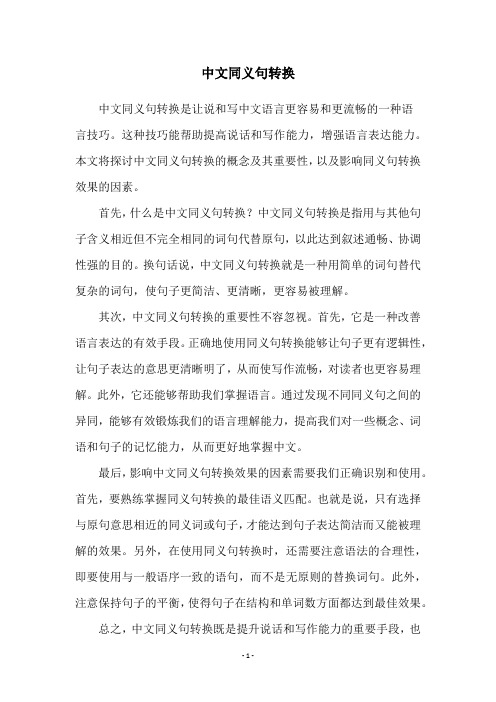
中文同义句转换
中文同义句转换是让说和写中文语言更容易和更流畅的一种语
言技巧。
这种技巧能帮助提高说话和写作能力,增强语言表达能力。
本文将探讨中文同义句转换的概念及其重要性,以及影响同义句转换效果的因素。
首先,什么是中文同义句转换?中文同义句转换是指用与其他句子含义相近但不完全相同的词句代替原句,以此达到叙述通畅、协调性强的目的。
换句话说,中文同义句转换就是一种用简单的词句替代复杂的词句,使句子更简洁、更清晰,更容易被理解。
其次,中文同义句转换的重要性不容忽视。
首先,它是一种改善语言表达的有效手段。
正确地使用同义句转换能够让句子更有逻辑性,让句子表达的意思更清晰明了,从而使写作流畅,对读者也更容易理解。
此外,它还能够帮助我们掌握语言。
通过发现不同同义句之间的异同,能够有效锻炼我们的语言理解能力,提高我们对一些概念、词语和句子的记忆能力,从而更好地掌握中文。
最后,影响中文同义句转换效果的因素需要我们正确识别和使用。
首先,要熟练掌握同义句转换的最佳语义匹配。
也就是说,只有选择与原句意思相近的同义词或句子,才能达到句子表达简洁而又能被理解的效果。
另外,在使用同义句转换时,还需要注意语法的合理性,即要使用与一般语序一致的语句,而不是无原则的替换词句。
此外,注意保持句子的平衡,使得句子在结构和单词数方面都达到最佳效果。
总之,中文同义句转换既是提升说话和写作能力的重要手段,也
是提高汉语水平的有效方法。
通过合理有效的练习和使用,不仅可以帮助我们更好地掌握汉语语法,还可以让我们的汉语书写更具有专业性和富有表现力。
初中同义句转换

初中同义句转换同义句转换1. I don’t know.I have no idea.2. lots of/ a lot of/ many sheeplots of/ a lot of/ much money3. She is in the music club.She is a member of the music club.4. They are in our school football team.They are members of our school football team.They play for our school football team.5. I spend an hour (in) reading.It takes me an hour to read.6. They are all Chinese. = All of them are Chinese.We are both teachers. = Both of us are teachers.7. I will fly to Beijing.I am going to fly to Beijing.8. hate/dislike doing …= don’t /doesn’t like doing…9. have fun / have a good time/ enjoy oneself10. The volleyball is very expensive.The volleyball costs me a lot of money.11. I want to buy…= I would like to buy…Do you want to buy…= Would you like to buy…12. now / right now / at present / at the moment13. Here comes Mr. Wu. = Mr. Wu is coming.Here it is. / Here they are.Here you are.14. Thank you for helping me.Thanks for your help.15. People make lanterns out of pumpkins.The lanterns are made of pumpkins.16. How much is the blouse?How much does the blouse cost?What’s the price of the blouse?How much do you spend on the blouse?How much do you pay for the blouse? 17. Miss Gao helps me learn English.Miss Gao helps me with my English.18. I am busy with my homework.I am busy doing my homework.19. He comes from America.He is from America.He is American.20. Where is the park?Can you tell me where the park is?Can you tell me the way to the park?21. She walks home after school.She goes home on foot.ride a bike to school= go to school by bike take the bus/ the taxi/ the train to…go to…by bus/taxi/train22. She is (dressed) in special costumes.She is wearing colourful trainers.23. look at=have a look at= take a look atchat with= have a chat withtalk with= have a talk with24. I have much work to do.There is much work (for me) to do.25. How do you say this in English? What’s this in English?26. Let’s have a hamburger, shall we?Shall we have a hamburger?Would you like to have a hamburger?What about/ How about having a hamburger? Why not have a hamburger?Why don’t you have a hamburger?27. It is time for lunch.It is time to have lunch.It is time (for us) to have lunch.28. What do you think of your jeans? Very good. / Very nice.How do you like your jeans? Very good. / Very much.29. She is Kitty.Her name is Kitty.We call her Kitty.She is called Kitty.30. What’s your favourite lesson? My favourite lesson is English. What lesson do you like best? I like English best.31. be good at / be clever at/ do well in32. We study English hard.We work hard at English.33. Drinking water is good for our health.It is good for our health to drink water.Watching too much TV is bad for your eyes.It is bad for your eyes to watch too much TV.34. give us some candy as a treatgive us a treat of some candy35. There will be a sports meeting next month.There is going to be a sports meeting next month.36. He began to learn English at 7.He began to learn English at the age of 7.37. How old are you?What’s your age?38. My birthday is on January 2nd.I was born on January 2nd.My birthplace is in Nanjing.I was born in Nanjing.39. There are more than eight hundred people in our school.Our school has more than eight hundred people.40. There is an apple and two mangoes on the shelf.There are two mangoes and an apple on the shelf.41. She doesn’t have brothers or sisters.She has no brothers or sisters.42. There are no calories in water.There are not any calories in water.43. I have no time to read comic books.There is no time (for me) to read comic books.44. it is a good place to run.It is a good place for running.45. It gives us much energy to dance.It gives us much energy for dancing.46. How do you spend your pocket money?What do you often buy with your pocket money?47. sth. fit sb. very well (⼤⼩合适)sth match sth very wellsth match/go well with sth48. You look cool in the jumper.The jumper looks cool on you.49. Can I help you?What can I do for you?50. I didn’t watch TV. I went to bed.I went to bed without watching TV.51. Where are you going? I am going to the clothes shop. Where are you going for a holiday/ for a trip?What do you do for Halloween?What are you going to wear for the fashion show?52. after that= afterwards53. walk the dogtake the dog for a walk54. finally= at last= in the end55. I don’t have enough money to buy her a hair clip.I don’t have enough money to buy a hair clip for her.56. What’s wrong with you?What’s the matter with you?57. I hope to see your best design soon.I hope I can/will see your best design soon.58. I borrowed a walkman from him.He lent a walkman to me.59. She is healthy.She is in good health.She has good health.60. He is not old enough to go to school. He is too young to go to school.61. There is a book on the desk.There is not a book on the desk.There is no book on the desk.62. There are some books on the desk. There are not any books on the desk. There are no books on the desk.63. I like apples and pears. (否定)I don’t like apples or pears.。
同义句转换英语例子

同义句转换英语例子
同义句转换是英语学习中非常重要的技能,它有助于我们拓宽词
汇量、理解句子结构、提高英语表达能力。
本文将介绍同义句转换的
基本概念及其常见用法,并举例说明如何进行转换。
同义句转换是将一个原始句子通过改变结构、符号或者单词来表
达同样的意思的过程。
这样可以使我们在写作或者口语中更加流利、
自然、准确地表达自己的思想。
同义句转换有一些常见的用法,例如:
1. 通过改变词性、使用同义词或者反义词等来表达同样的意思;
2. 使用不同的句型和语法结构,将原始句子转换成复合句或者简
单句;
3. 简化冗长的句子,或者将长句拆分成短句以提高文章的可读性。
下面是一些同义句转换的例子:
1. 原始句子:Mary is taking a shower.
同义句:Mary is showering.
2. 原始句子:He is a talented musician.
同义句:He has a talent for music.
3. 原始句子:She can't speak French very well.
同义句:Her French is not very good.
4. 原始句子:Although it was raining, she still went for
a walk.
同义句:Despite the rain, she still went for a walk.
同义句转换是通过增强我们的语言技能,提高我们的写作和口语
水平的重要方法之一。
要想用同义句转换有效提高自己的英语表达能力,需要不断积累词汇、掌握句型和语法结构、增强写作和口语实践。
同义句转换口诀顺口溜
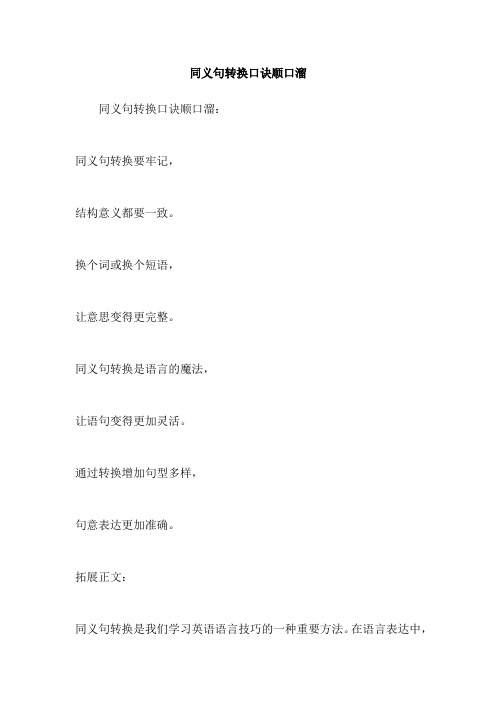
同义句转换口诀顺口溜
同义句转换口诀顺口溜:
同义句转换要牢记,
结构意义都要一致。
换个词或换个短语,
让意思变得更完整。
同义句转换是语言的魔法,
让语句变得更加灵活。
通过转换增加句型多样,
句意表达更加准确。
拓展正文:
同义句转换是我们学习英语语言技巧的一种重要方法。
在语言表达中,
我们常常需要用不同的句子来表达相同的意思。
同义句转换可以通过改变词语或短语,使句子的结构和意义保持一致,但使用不同的表达方式来传达相同的信息。
这一技巧非常有用,可以帮助我们丰富语言表达,提高写作和口语能力。
通过同义句转换,我们可以避免使用重复的词语,使句子更加流畅自然。
此外,同义句转换也可以帮助我们理解和解析他人的表达,提高阅读和听力理解能力。
为了熟练掌握同义句转换,我们需要不断练习和积累。
首先,我们可以通过查阅词典和学习资料来了解词语的不同用法和近义词。
其次,我们可以通过模仿和仿写来练习同义句转换,将一句话转换成多个具有相同意思的句子。
最后,我们还可以参加英语辩论或写作比赛等活动,将同义句转换的技巧应用到实际语言运用中。
总而言之,同义句转换是提高语言表达能力的重要方法。
通过掌握这一技巧,我们可以丰富语言表达,提高写作和口语能力,更好地理解和运用英语。
在学习中,我们需要多加练习和积累,不断提高自己的语言水平。
同义句转换,让我们的语言变得更加生动有趣!。
同义句转换——精选推荐
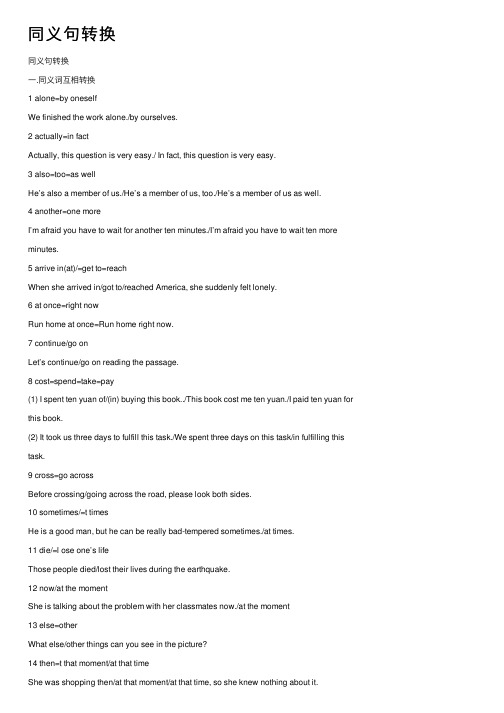
同义句转换同义句转换⼀.同义词互相转换1 alone=by oneselfWe finished the work alone./by ourselves.2 actually=in factActually, this question is very easy./ In fact, this question is very easy.3 also=too=as wellHe’s also a member of us./He’s a member of us, too./He’s a member of us as well.4 another=one moreI’m afraid you have to wait for another ten minutes./I’m afraid you have to wait ten more minutes.5 arrive in(at)/=get to=reachWhen she arrived in/got to/reached America, she suddenly felt lonely.6 at once=right nowRun home at once=Run home right now.7 continue/go onLet’s continue/go on reading the passage.8 cost=spend=take=pay(1) I spent ten yuan of/(in) buying this book../This book cost me ten yuan./I paid ten yuan for this book.(2) It took us three days to fulfill this task./We spent three days on this task/in fulfilling this task.9 cross=go acrossBefore crossing/going across the road, please look both sides.10 sometimes/=t timesHe is a good man, but he can be really bad-tempered sometimes./at times.11 die/=l ose one’s lifeThose people died/lost their lives during the earthquake.12 now/at the momentShe is talking about the problem with her classmates now./at the moment13 else=otherWhat else/other things can you see in the picture?14 then=t that moment/at that timeShe was shopping then/at that moment/at that time, so she knew nothing about it.15 like/love/enjoy/be fond of/be interested in/care forShe likes/enjoys/loves/is fond of/is interested in/cares for collecting stamps very much.16 will/be going to/be about toThe teachers will/are going to/are about to have a meeting tomorrow afternoon.17 want/would like同义句转换2Do you want to go abroad to study further?/Would you like to go abroad to study further/18 can/be able to/have the ability to doCan you tell me the way to the library?/Are you able to tell me the way to the library?/Do you have the ability to tell me the way to the library?19 visit/call onLin Tao visited/called on his grandparents last week.20 favorite/like bestWhat’s your favorite sport?/What sport do you like best?21 happen/take placeWhat happened?/What took place?22 decide/make a decisio n/make up one’s mindShe can’t decide/make a decision/make up her mind where to go.23 found/establish/set upThe students founded/established/set up a group to protect the environment.24 finally/at last/in the endFinally/At last/In the end, she won the race.25 leave/be awayHe left yesterday./He has been away for a day.26 return/give backHe hasn’t returned the book to me./He hasn’t given the book back to me.return/go backHe will go back/return in a month.27 why/what for/how come-She cried so badly. –How come?What did she cry so sadly for?/Why did she cry so badly?28 over/more thanOver/More than a hundred people tried this new kind of food.29 whatever/no matter whatWhatever/No matter what you find in the box, they belong to Amy.30 whenever/no matter whenWhenever/No matter when you come to see me, I will treat you as my relative.31 walk/ go…on footDo you walk to school every day?/Do you go to school on foot every day?32 should/ought to/be supposed toWe should/ought to/are supposed to use both sides of the paper to reduce wastes.33 population/peopleWhat is the population of China?/How many people are there in China?34 quit/stop/drop/give up同义句转换3My father quitted/stopped/dropped/gave up smoking.35 maybe/perhaps/may beMaybe/Perhaps it is not my pen./ The pen may not be mine. ⼆同义词组互相转换1 a lot of/lots ofA lot of/Lots of artists will show their faces at the party.2 all over the world/around the worldEnglish is spoken widely all over the world./around the world 3 not as(so)…as/less thanThis book is not as(so) interesting as that one./That book is more interesting than this one.4 as…as possible/as…as sb canRun home as fast as possible/as fast as you can to tell your mother the good news.5 at risk/in danger/in troubleThe pandas in our country are at risk./in trouble/in danger6 at the age of…/when sb.+be+…years oldHis parents died when he was six years old./His parents died at the age of six.7 because of/due to/as a result of/with one’s help/thanks to Because of?/Due to/As a result of his help, he passed this exam. With his help/With the help of him, he passed theexam./Thanks to his help, he passed the exam.8 be careful/look out/take careLook out!/Be careful/Take care! The flood is coming.9 be worried about/worry aboutLiu Ming is worried about his following oral test./Liu Ming can’t stop his following oral test.10 both…and…/not only…but also…He is not only a singer but also a doctor./He is both a singer and a doctor.11 be good at/do well inHe is good at drawing./He does well in drawing.12 be proud of/take pride inWe are all proud of our country’s astronaut./He takes pride in our country’s astronaut.13 come up with/think of/have an ideaTome came up an idea./Tom thought of an idea./Tom had an idea.14 ride a bike/go…by bikeHe often rides a bike to work./He often goes to work by bike. 15 come from/be fromWhere do you come from?/Where are you from?16 have a good time/enjoy oneself//play happilyWe had a good time/enjoyed ourselves/played happily on Christmas Day.17 have a pain in head/have a headache同义句转换4He didn’t go to school today, because he had a pain inhead./had a headache18 hear from/receive(get) a letter fromShe is very happy to hear from/receive a letter from a Canadian friend.19 had better do/It’s best to doYou had better read in the sun./It’s best for you to read in the sun.20 how about/what aboutHow about/What about going skating?21 in order to/in order that/to do/so thatHe worked day and night to be a successful man./He worked day and night in order to be a successful man./He worked day and night in order that he could be a successful man./He worked day and night so that he could be a successful man.22 keep off/keep away fromKeep off /Keep away from the grass!23 in/wearShe is in/wears a white dress today.24 keep sb. from doing/stop sb. (from) doing/prevent sb. (from) doingTrees can stop the soil flowing away./ Trees can prevent the soil flowing away./Trees can keep the soil from flowing away.25 learn …by oneself/ teach oneselfNobody taught him. He learnt it by himself./He taught himself.26 like …better than/prefer…to…/prefer to do…rather than do …John likes swimming better than skating./John prefers swimming to skating./John prefer to swim rather than skate.27 long, long ago/once upon a timeLong, long ago/Once upon a time, there was a beautiful princess living in an old castle.28 look after well/take good care ofThanks for looking after my cat /taking good care of my cat well while I was away.29 no longer/not …any longerShe is no longer a little girl./She is not a little girl any longer.30 shall we/Let’s..Shall we watch the film together?/Let’s watch the film together.31 take part in/join in/participate inHe took part in /joined in/participated in the match.32 too…to/so…that…/enough to…He is too busy to visit us./He is so busy that he can’t visit us./He is not free enough to visit us.三同义句型互相转换1 运⽤两种时态(⼀般过去时和现在完成时互相转换)(1) He left last year.同义句转换5(2) He has been away for one year.(3) He has been away since a year ago.(4) It is a year since he left.(5) One year has passed since he left.2 最⾼级和⽐较级的互相转换(1) He is the tallest student in his class.(2) He is taller than any other student in his class.(3) He is taller than the other students in his class.(4) No one else is taller than him in his class.3 运⽤两种语态(主动语态和被动语态互相转换)I clean my room every day./My room is cleaned every day.4 感叹句的两种句型之间互相转换What a careful girl she is!/How careful the girl is!5 运⽤关联词语合并句⼦(1) Amy can’t dance. Susan can’t, either.Neither Amy nor Susan can dance.(2) I has eaten breakfast and my mother has eaten it, too. Both my mother and I have eaten breakfast.6 运⽤复合句和不定式互相转换(1) I hope that I can visit the moon one day./I hope to visit the moon one day.(2) He told me how he could use a computer./He told me how to use a computer.7 运⽤不同的句式结构互相转换(1) She wants to go shopping and her friends want to go shopping, too./She wants to goshopping, and so do her friends.(2) He went to bed after he finished his homework./He went tobed after finishing hishomework./He didn’t go to bed until he finished his homework.(3) Come on, or we’ll miss the early bus./If we don’t hurry, we’ll miss the early bus.(4) The man gave us a talk last week, and he will give us another talk this week./The man whogave us a talk last week will give us another talk this week.8 ⽤it 做形式主语互相转换(1) He can finish the work easily./It is easy for him to finish the work.(2) We found it hard to shake./We found it was hard to skate. 同义句转换6四实战演练1People everywhere sat and laughed at them until the tears ran down their faces.People ______ and _______sat and laughed at them until the tears ran down their faces.2Fred was visiting his mother on her 95th birthday.Fred was visiting his mother _______ she was ______ years old. 3She lives alone.She lives ________ __________.4 Due to the way they eat, they have a high rate of cancer and heart disease.________ ________ the way they eat, they have a high rate of cancer and heart disease.5 But it took her a long time to find out.But she ______ a long time _______ out.6 Ten years later, Tom became a strong boy and became a good swimmer, too.Ten years later, Tom became _______a strong boy ________ a good swimmer.7 Shy people are also good at working with others because they think more for other people.She people also ________ ______ in working with others because they think more for otherpeople.8 Mark decided to go sailing in his boat with his friend Dan. Mark _______ a ________ to go sailing in his boat with his friend Dan.9 Once there was something wrong with a machine in a factory. Once a machine in a factory ________ __________.10 When parents have poor eating habits, their children usually do, too.When parents have poor eating habits, _______ ________ their children.11 In the computer game houses, it takes people a lot of money competing with the machines.People _____ ______ money in competing with the machines in the computer games houses.12 When the local police began to look for the pigs, newspaper reporters from around thecountry joined them.When the local police began to look for the pigs, newspaper reporters from ________ _______the country joined them.13 When he first reached the island, he didn’t know what he could find in this strange place.When he first _________ _______ the island, he didn’t know what he could find in this strangeplace.14 Some dentists say that chewing sugarless gum can help take care of people’s teeth.Some dentists say that chewing sugarless gum can help________ ________ people’s teeth.15 He was different from other children.He was _______ the ______ as other children.16 Bob is twice as old as Jack, so he is now thirty.Jack is _______ years ________ than Bob.17 I teach something to air hostesses.同义句转换7Air hostesses ________ something _______ me.18 The world is full of variety.The world is ________ _________ variety.19 To his surprise, the taste was nice.He was ______ ______ the taste was nice.20 Once in the area, a car s almost a must.You _______ ______ take a car in the area.21 But when you are joined to the Internet, there are many things you can do.But when you are joined to the Internet, there are ________________ things you can do.22 Beijing will be rainy.There will be _______ ________ Beijing.23 Mrs Smith and her friends worked hard and the idea was interesting to more and more peopleMrs Smith and her friends worked hard and more and more people over the country became___________ _______ the idea.24 But now there is a Winter Swimming Club and it has over 2,000 members.But now there is a Winter Swimming Club and it has _________ ________ 2,000 members.25 Before crossing the road, stop and look both ways.Before ______ _______ the road, stop and look both ways.26 We call this mark “watermark”.This mark ____ ____ “watermark”.27 They hoped the government would act quickly to conserve nature.They hoped the government would act quickly _______ _______ to conserve nature.28 The Komodo lizard is the world’s largest lizard.The Komodo lizard is larger than ______ _____ lizard in the world.29 We haven’t done anything to improve the exam system.We have _______ _______ to improve the exam system.30 It is much harder to do it with TV or radio advertisements. It is much ______ ________ to do it with TV or radio advertisements.31 He was unable to walk any more.He ______ _______ walked.32 The bookshelf was too heavy for Miss Green to carry.The bookshelf was _____ heavy ______ Miss Green didn’t carry it.33 In order to solve this population problem, China has begun a “one-child’ policy.China has begun a “one-c hild” policy ______ ________ it solved this population problem.34 He scored more goals than anyone else on his team.He scored _______ _______ goals on his team.35 He spent very little time at school, perhaps no more than a year in all.同义句转换8It _______ _______ very little time at school, perhaps no more than a year in all.36 A school inspector was coming to visit a school.A school inspector was _____ a visit _____ a school.37 Why not look at the funny side and laugh instead?_________ ________ you look at the funny side and laugh instead?38 Good movies are the ones that you remember and like to see another time.Good movies are the ones that you remember and like to see ________ than _______.39 Many public people use web blogs to express their thoughts. Many public people use web blogs ________ ________40 I think maybe it was left on the shelf in the bedroom.I think it _______ _____ left on the shelf in the bedroom.41 Both my father and my mother came from towns in Mexico. Both of _____ _______ came from towns in Mexico.42 When Bloom was 16, he moved to London.At the _______ _____ 16, Bloom moved to London.43 I was born in Amsterdam and lived there for many years.I ________ ______ in Amsterdam.44 Nobody had ever seen such a big orange.Nobody had ever seen _____ big ________ orange.45 Sometimes she only sleeps for no more than four hours.________ ________ she only sleeps for no more than four hours.46 She bought me many presents.She bought many presents ______ ______.47 The winter will be full of happiness by your own hands. The winter will be ______ ________ happiness by your own hands.48 They all agreed with me.They all ______ yes ________ me.49 Beautiful flowers need pollinating.Beautiful flowers need _______ _______ pollinated.50 The girl smiled sweetly, so he felt very happy.The _____ smile of the girl ______ him very happy.51 I don’t like growing flowers. Mary doesn’t like growing flowers, either._______ I ______ Mary likes growing flowers.52 Giving makes people happy, not only those who receive, but also those who give.Giving makes people happy, ________ those who receive _______ those who give.53 Your promises are too big, and then they won’t be able to win people’s trust.Your promises are ______ big ___ be able to win people’s trust. 54 What a serious thing a promise is!同义句转换9_________ _______ a promise is!55 They only want to win.They want _______ _______ to win.56 The better you get along with others, the easier it is for you to succeed.Get along _______ with others and that helps you succeed______.57 It was stu ck and he couldn’t talk or breathe.It was stuck and he could _______ talk ______ breathe.58 What do you think of the music?_______ do you ________ the music?59 I am 190cm and Jenny is 190cm, too.Jenny is ______ tall _____ I.60 How about playing basketball with us?________ ________ playing basketball with us?61 Mary and Tom donated money to the poor children.62 The rain was heavy yesterday.It ______ _______ yesterday.63 I hope that I can visit the moon some day.I hope ________ _______ the moon some day.64 Jenny’s grandmother died two years ago.Jenny’s grandmother ______ been ______ for two weeks.65 He can finish the work easily.66 He got up so late that he couldn’t catch the bus.He got up ________ ________ ________ catch the bus.67 Walking after meals is very helpful._______ is very helpful _______ walk after meals.68 Actually, we have been friends for long.________ _______, we have been friends for long.69 My coat is similar to yours in many ways.Our coats have a lot _______ ________.70 Mother takes care of you as much as possible.Mother _______ ________ you as much as possible.71 However, experts say that the tea does not have relation to Tibet. However, experts say that the tea has _______ to _______ with Tibet.72 I’m supposed to d o some homework this weekend.I _______ ________ some homework this weekend.73 She was glad she kept her promise.She was glad _________ ________ her promise.74 The princess told the frog to leave.同义句转换10The frog ______ told ________ leave by the princess.75 We had a great time going on a picnic.We _______ ________ going on a picnic.76 I shall do whatever you please.I shall do ______ ________ what you please.77 I’m from China.My _________ is _________.78 How long is the classroom?_________ is the _______ of the classroom?79 I am the owner of the dictionary.The dictionary ________ _________ me.80 I’m looking forward to seeing her again.I _______ ________ see her again.答案:1 here, there 2 when, 95 3 by herself 4 Because, of 5 spent, finding 6 both, and 7 do, well 8 made, decision 9 didn’t, work 10 so, do 11 spend, much 12 all, over13 got, to 14 look, after 15 not, same 16 fifteen, younger 17 learns, from 18 filled, with 19 surprised, at 20 have, to 21 lots, of 22 much, rain 23 interested, in 24 More, than25 going across 26 is called 27 in order 28 any other 29 done, nothing 30 more, difficult 31 no, more 32 so, that 33 so, that 34 the, most35 took, him 36 on, to 37 Why, don’t 38 more, once 39 for, expressing 40 may, be41 my, parents 42 age, of 43 grew, up 44 so, an 45 At, times 46 for, me 47 filled,with 48 said, to 49 to, be 50 sweet, made 51 Neither, nor 52 both, and 53 too, to54 How, serious 55 nothing, but 56 well, easily 57 neither, nor58 How, like59 as, as 60 What, about 61 Not only, but also 62 rained, heavily 63 to, visit64 has, dead 65 easy, to 66 too late to 67 It, to 68 In, fact 69 in, common70 looks, after 71 nothing, do 72 should, do 73 to, keep 74 was, to 75 enjoyed, ourselves 76 no. matter 77 nationality, Chinese 78 What, length79 belongs, to80 expect, to。
英语同义句转换的名词解释
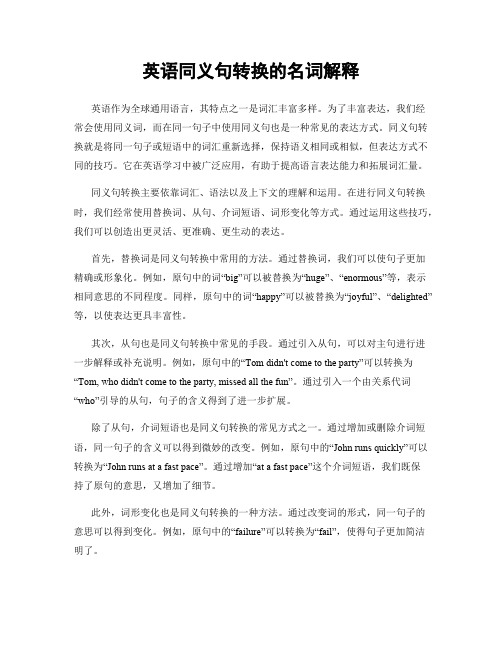
英语同义句转换的名词解释英语作为全球通用语言,其特点之一是词汇丰富多样。
为了丰富表达,我们经常会使用同义词,而在同一句子中使用同义句也是一种常见的表达方式。
同义句转换就是将同一句子或短语中的词汇重新选择,保持语义相同或相似,但表达方式不同的技巧。
它在英语学习中被广泛应用,有助于提高语言表达能力和拓展词汇量。
同义句转换主要依靠词汇、语法以及上下文的理解和运用。
在进行同义句转换时,我们经常使用替换词、从句、介词短语、词形变化等方式。
通过运用这些技巧,我们可以创造出更灵活、更准确、更生动的表达。
首先,替换词是同义句转换中常用的方法。
通过替换词,我们可以使句子更加精确或形象化。
例如,原句中的词“big”可以被替换为“huge”、“enormous”等,表示相同意思的不同程度。
同样,原句中的词“happy”可以被替换为“joyful”、“delighted”等,以使表达更具丰富性。
其次,从句也是同义句转换中常见的手段。
通过引入从句,可以对主句进行进一步解释或补充说明。
例如,原句中的“Tom didn't come to the party”可以转换为“Tom, who didn't come to the party, missed all the fun”。
通过引入一个由关系代词“who”引导的从句,句子的含义得到了进一步扩展。
除了从句,介词短语也是同义句转换的常见方式之一。
通过增加或删除介词短语,同一句子的含义可以得到微妙的改变。
例如,原句中的“John runs quickly”可以转换为“John runs at a fast pace”。
通过增加“at a fast pace”这个介词短语,我们既保持了原句的意思,又增加了细节。
此外,词形变化也是同义句转换的一种方法。
通过改变词的形式,同一句子的意思可以得到变化。
例如,原句中的“failure”可以转换为“fail”,使得句子更加简洁明了。
中考考点专题归纳28--同义句转换

中考考点专题归纳—同义句转换一热点分析:同义句转换历来是中考的热点和难点,也是学生们最容易出错的题目.现总结以下规律帮助其轻松解答.二同义句转换的种类:⑴:上下对齐式: 这类同义句转换相对简单主要考查:同义词/同义词组之间的转换.如:1.be good at = do well in (此短语的难题是与比较级相结合)2.have a good time = enjoy oneself = have fun3.such +a/ an + adj + N = so +adj + a / an (此结构只有名词为单数可数名词时成立)4.at the age of + 数词= when sb was +数词5.shall we + V = why not + V = why don’t you + V = what / how about + Ving6.To v … = It is adj (for sb / of sb ) to do sth7.look like = look the same = take after8.Don’t worry = don’t be worried9.not any more = no more10.not any longer = no longer11.help sb with = help sb to do / do sth12.like ving sth better than ving sth = prefer ving sth to ving sth13.like + 学科/ 项目best = 学科/ 项目is one’s favorite subject/ sports.14.sb found / saw sb ving = sb found / saw that + 主+ link verb + ving15.anything else = other things⑵:同义句式间的转换中考这类题目考查的比较多而且常以经典同义句转换居多,故下面特总结经典同义句转换。
英语同义句转换的方法

英语同义句转换的方法英语同义句转换是指将一个句子的含义保持不变,但使用不同的词语或表达方式来表达。
下面我将分享一些英语同义句转换的方法,希望对你有所帮助。
方法一:使用同义词或近义词同义词是具有相似或相同含义的词语,通过使用同义词或近义词来替换原句中的词语可以实现同义句转换。
例如:原句:The weather is beautiful today.同义句:The weather is lovely today. (beautiful - lovely)方法二:使用形容词或副词通过使用不同的形容词或副词来改变句子的表达方式,达到同义句转换的效果。
例如:原句:She speaks English fluently.同义句:She speaks English proficiently. (fluently - proficiently)方法三:使用否定词通过添加否定词或将否定词移动到不同的位置来改变句子的含义。
例如:原句:He always arrives on time.同义句:He never arrives late. (always - never)方法四:使用被动语态将主动语态的句子转换为被动语态可以改变句子的表达方式。
例如:原句:They built a new library.同义句:A new library was built by them. (built - was built by)方法五:使用倒装句将句子中的主语和谓语动词颠倒位置,形成倒装句,以此来改变句子的语序和表达方式。
例如:原句:He rarely goes to the gym.同义句:Rarely does he go to the gym. (He - Rarely)方法六:使用从句或连接词通过引入从句或使用不同的连接词来改变句子的句式和表达方式。
例如:原句:He likes both cooking and baking.同义句:He enjoys both cooking and baking. (likes - enjoys)方法七:使用同一根词的不同词形通过使用同一根词的不同词形,如名词、动词、形容词和副词,来改变句子的表达方式。
比较级的同义句句型转换

比较级的同义句句型转换1. 比较级同义句啊,就像是给同一个意思换件漂亮衣服。
比如说“Tom is taller than Jack.”,那同义句就可以是“Jack is shorter than Tom.”,这多简单呀,就像把苹果从左手换到右手一样。
你看,这一换,意思还是那个意思,只是说法不一样了。
2. 比较级的同义句转换呀,就像玩文字游戏一样有趣。
拿“Lily is more beautiful than Lucy.”来说吧,同义句不就是“Lucy is less beautiful than Lil y.”嘛。
这就好比两个小姐妹比漂亮,从这个角度说和从那个角度说,都是在比谁更漂亮,真的超级有意思呢!3. 比较级同义句的转换可神奇啦!就像魔术一样。
“My book is thicker than yours.”那它的同义句“Your book is thinner than mine.”不就像是把书的厚度从这边挪到了那边吗?你难道不觉得这很奇妙吗?4. 哟,比较级同义句转换哦。
这就像是在两座桥之间走,不管从哪座桥走,都能到达对岸。
像“His dog is bigger than mine.”同义句“ My dog is smaller than his.”就是这么个事儿,是不是感觉豁然开朗呀?5. 比较级同义句转换呀,有点像给故事换个讲述角度。
比如“Mary is more intelligent than Jane.”,那同义句“Jane is less intelligentthan Mary.”就像是从Jane的角度去看她们俩的聪明程度了。
这多酷啊,就像从正面看一幅画和从侧面看一幅画一样,都是那幅画,只是视角不同。
6. 比较级同义句转换啊,就像在不同的镜子里看同一个东西。
你看“Peter runs faster than Paul.”,同义句“Paul runs mo re slowly than Peter.”就像是在不同速度的镜子里看他们跑步一样。
同义句转换的方法与技巧
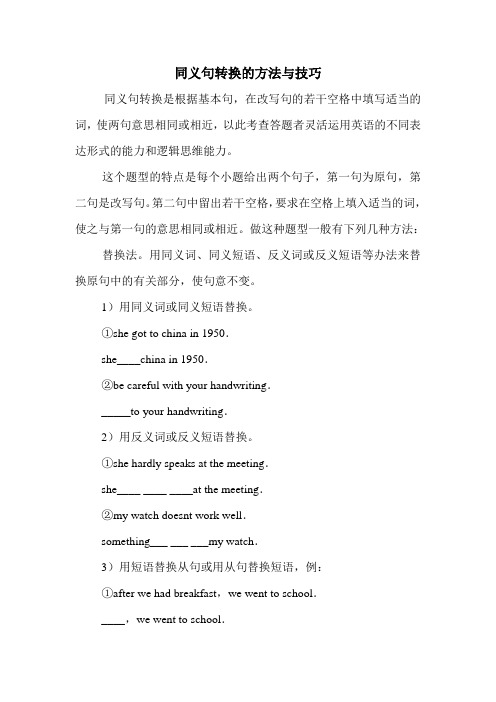
同义句转换的方法与技巧同义句转换是根据基本句,在改写句的若干空格中填写适当的词,使两句意思相同或相近,以此考查答题者灵活运用英语的不同表达形式的能力和逻辑思维能力。
这个题型的特点是每个小题给出两个句子,第一句为原句,第二句是改写句。
第二句中留出若干空格,要求在空格上填入适当的词,使之与第一句的意思相同或相近。
做这种题型一般有下列几种方法:替换法。
用同义词、同义短语、反义词或反义短语等办法来替换原句中的有关部分,使句意不变。
1)用同义词或同义短语替换。
①she got to china in 1950.she____china in 1950.②be careful with your handwriting._____to your handwriting.2)用反义词或反义短语替换。
①she hardly speaks at the meeting.she____ ____ ____at the meeting.②my watch doesnt work well.something___ ___ ___my watch.3)用短语替换从句或用从句替换短语,例:①after we had breakfast,we went to school.____,we went to school.②we cant finish the work without your help.we cant finish the work____you_____us.转换法。
这种方法是用不同句型、句式、语态、引语等方法改写句子,使其意思相同。
1)句型转换。
如:①they have been in the army for ten years.___ ____ten years____they joined the army.②the great pyramid is the biggest of all the pyramid.the great pyramid is____any other pyramid.2)句式转换。
同义句转换口诀顺口溜
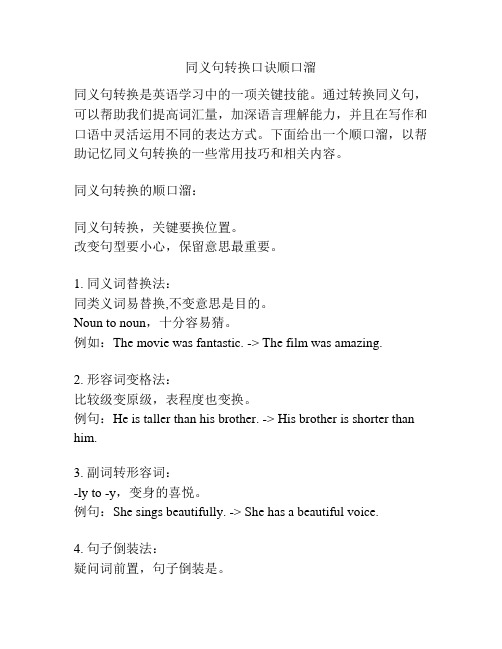
同义句转换口诀顺口溜同义句转换是英语学习中的一项关键技能。
通过转换同义句,可以帮助我们提高词汇量,加深语言理解能力,并且在写作和口语中灵活运用不同的表达方式。
下面给出一个顺口溜,以帮助记忆同义句转换的一些常用技巧和相关内容。
同义句转换的顺口溜:同义句转换,关键要换位置。
改变句型要小心,保留意思最重要。
1. 同义词替换法:同类义词易替换,不变意思是目的。
Noun to noun,十分容易猜。
例如:The movie was fantastic. -> The film was amazing.2. 形容词变格法:比较级变原级,表程度也变换。
例句:He is taller than his brother. -> His brother is shorter than him.3. 副词转形容词:-ly to -y,变身的喜悦。
例句:She sings beautifully. -> She has a beautiful voice.4. 句子倒装法:疑问词前置,句子倒装是。
例句:He has never been to Paris. -> Never has he been to Paris.5. 被动语态转换法:物主变主语,动作仍在继续。
例句:The book was written by J.K. Rowling. -> J.K. Rowling wrote the book.6. 名词转动词法:名词动化,行动的表达。
例句:She made a decision. -> She decided.7. 定语从句变定语短语:去掉关系词,剩下修饰。
例句:This is the girl who won the competition. -> This is the competition-winning girl.8. 同义短语替换法:意思互通,随心替换。
英语同义句转换的方法
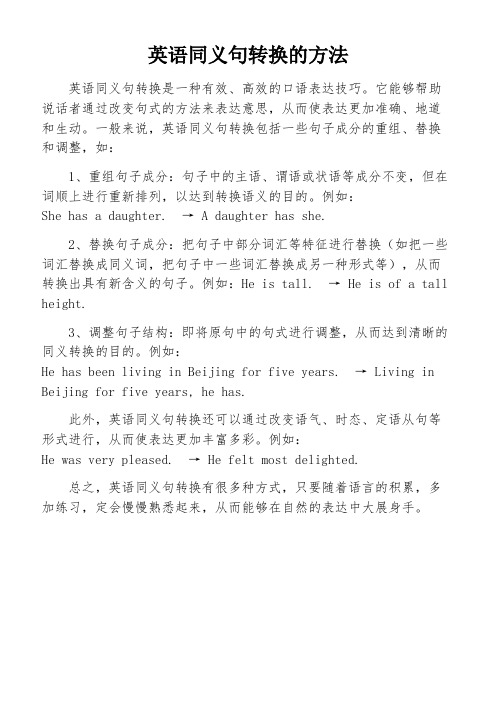
英语同义句转换的方法
英语同义句转换是一种有效、高效的口语表达技巧。
它能够帮助说话者通过改变句式的方法来表达意思,从而使表达更加准确、地道和生动。
一般来说,英语同义句转换包括一些句子成分的重组、替换和调整,如:
1、重组句子成分:句子中的主语、谓语或状语等成分不变,但在词顺上进行重新排列,以达到转换语义的目的。
例如:
She has a daughter. → A daughter has she.
2、替换句子成分:把句子中部分词汇等特征进行替换(如把一些词汇替换成同义词,把句子中一些词汇替换成另一种形式等),从而转换出具有新含义的句子。
例如:He is tall. → He is of a tall height.
3、调整句子结构:即将原句中的句式进行调整,从而达到清晰的同义转换的目的。
例如:
He has been living in Beijing for five years. → Living in Beijing for five years, he has.
此外,英语同义句转换还可以通过改变语气、时态、定语从句等形式进行,从而使表达更加丰富多彩。
例如:
He was very pleased. → He felt most delighted.
总之,英语同义句转换有很多种方式,只要随着语言的积累,多加练习,定会慢慢熟悉起来,从而能够在自然的表达中大展身手。
同义句转换口诀顺口溜

同义句转换口诀顺口溜同义句转换是英语学习中的一项重要技能,它可以帮助我们扩大词汇量,提高表达能力。
在进行同义句转换时,我们可以运用同义词、反义词、词组、从句等多种方法,下面是一些与同义句转换相关的参考内容,以及一个可以帮助记忆的顺口溜。
一、同义词转换1. 通过替换动词、名词、形容词等关键词,使用同义词转换的方法,可以帮助我们表达的更加准确和生动。
例句1:She is a beautiful girl.同义句:She is an attractive girl.例句2:The weather today is very hot.同义句:The weather today is extremely warm.二、反义词转换2. 反义词转换是指通过运用反义词来转换同义句,使之表达的意思相反。
例句1:He is happy.反义句:He is sad.例句2:The room is clean.反义句:The room is dirty.三、词组转换3. 通过使用词组,我们可以更加生动地表达同义句。
例句1:I am very tired.词组转换:I am worn out.例句2:She is afraid of snakes.词组转换:She has a fear of snakes.四、从句转换4. 通过使用从句,我们可以更加灵活地表达同义句。
例句1:I want to know where he lives.从句转换:I want to find out his place of residence.例句2:She doesn't know when he will arrive.从句转换:She is unsure about his arrival time.五、顺口溜同义句转换要注意,备选项得仔细想。
找同义词和反义词,词组和从句都用上,同义句转换样样好。
同义词转换更准确,质感丰富句型要用。
同义句转换的常见方法

同义句转换的常见⽅法 所谓同义句转换就是将⼀个句⼦⽤另⼀种形式表达出来,⽽且意思不变。
下⾯店铺整理了同义句转换的常见⽅法,希望对你有所帮助! 同义句转换是什么意思 同义句转换就是把⼀个句⼦⽤另外⼀种结构表达出来,当然要保证句意不能改变。
同义词简介 同义词,是指词汇意义相同或相近的词语,如:美好和美妙、懒惰和怠惰、“枯萎”和“⼲枯”、“宽敞”和“宽阔”。
与“该词”意思相近的词为同义词。
(1)从词语的搭配上:如“交流”和“交换”,“交流”多偏重于虚的事物,“交换”多偏重于实的东西 (2)从语法功能上辨析:“公然”、“公开”公然;只能当状语。
“公开”可以充当状语、谓语、定语等。
同义句转换的九种类型 同义句转换题是近⼏年中考英语的⼀个常考题型,其出题形式通常是同时给出两个句⼦,第⼀句完整,第⼆句中设有⼏处空格,要求考⽣填⼊适当的词或词组,使第⼆句的意思与第⼀句意思相同。
它综合考查考⽣的语法、词汇、短语或习惯⽤语和句型结构等知识,要求运⽤所学的词汇、语法知识和句型结构填写句⼦,使句⼦结构完整、逻辑合理、语法知识⽆误、意思与所给句⼦相同。
通过对近⼏年的中考英语试题中同义句转换题的分析,我们发现中考英语同义句转换题主要考查以下⼏个⽅⾯: ⼀、运⽤同义词(组)进⾏转换 ⽤同义词或同义词组对原句中的某些词或词组进⾏替换,注意转换后的词或词组的词形变化要与句⼦其他成分相适应。
如: 1. That day we could see flowers here and there. That day we could see flowers __________. 分析:答案为everywhere。
everywhere与here and there都表⽰“到处”。
2. The teacher always takes good care of the children in the school. The teacher always_______ ______the children well in the school. 分析:答案为looks after。
- 1、下载文档前请自行甄别文档内容的完整性,平台不提供额外的编辑、内容补充、找答案等附加服务。
- 2、"仅部分预览"的文档,不可在线预览部分如存在完整性等问题,可反馈申请退款(可完整预览的文档不适用该条件!)。
- 3、如文档侵犯您的权益,请联系客服反馈,我们会尽快为您处理(人工客服工作时间:9:00-18:30)。
5. There are trees on __b_o_t_h__ sides of the street.
6. There are trees on _e_i_th__e_r/_e_a_c_h_ side of the street.
The boy isn’t __o_ld___ _e_n_o_u_g_h__ __t_o___ dress himself. 11. No one knows anything about it but my parents.
No one _b_u_t_/e_x_c_e_p_t_ my parents k_n__o_w_s anything about it. 12. He didn’t play soccer yesterday. I didn’t, either.
_E__it_h_e_r_ __o_f ___ the books is interesting. 3. She doesn’t need both a size and a feeling. (同义句)
I left it _e_it_h_e_r_ on the table ___o_r___ in the drawer. 5. We like English very much. We like English _a___ __lo_t_. 6. Thank you for your help. _T_h_a_n_k_s__ for __h_e_l_p_in_g__ me. 7. We are all fine. _E_v_e_r_y_o_n_e_ is _w__e_ll_/O__K__.
11. ________ you and he were sad to hear the bBadothnews yesterday.
12. It’s ________ of your business. 13. ______nhonaeve/has arrived yet. 14. _N_o_n_e__ of us are/is afraid difficulties.
同义句转换,每空一词: 8. Maybe your book is in the desk.
Your book ___m_a_y__ ____b_e___ in the desk. 9. The passage isn’t difficult for me to read.
The passage is __s_o__ __e_a_s_y_ __th__a_t __ I can read it. 10. The boy is too young to dress himself.
7. I have three pencils. _A__ll_/N__o_n_e____ of them are red.
8. ___A_l_l/_E_a_c_h_/N__o_n_e_ of the students in our class went to the
zoo last week.
用all, both, neither, either, every, each, none填空
He didn’t play soccer yesterday. __N_e_it_h_e_r_/_n_o_r _d_i_d_ _I__. 13. He has been to Tokyo. I have been to Tokyo, too.
He has been to Tokyo. __S__o___ __h_a_v_e___ ____I ___.
7. Neither of them a_r_e_a teacher.
is
won’t
8. If you don’t go to the meeting tomorrow, I d_o_n_’_t, either.
9. You don’t know his address. S__o_do I. Neither/Nor
12. – I like taking a walk after supper.
– S_o__I_d_o_.
So do I.
13. – Which would you like, tea or coffee?
-- E__it_h_e_r. Just a glass of water, please. Neither
14. – When shall we meet again next month?
-- _E_v_e_r_y day is possible. It’s no problem with me. Any
15. Your digital watch is quite nice. Where did you buy
9. Not only he but also she ___li_k_e_s__(like) pop music.
10. If I __w_e_r_e__ a bird, I __w_o_u_l_d_f_l_y___(fly) to the sky.
同义句转换,每空一词:
1. He doesn’t have a mobile phone. And she doesn’t have one, either. N__e_it_h_e_r_ he __n_o_r__ she __h_a_s___ a mobile phone.
There are tall trees on _e_i_th__er_ side of the road. There are tall trees on __b_o_th___ sides of the road. 2. Both of the two books aren’t interesting. (同义句) _O_n_l_y__ __o_n_e___ book is interesting.
3. 约翰和麦克都擅长游泳。(both … and …) Both John and Mike are good at swimming.
4. 不仅你,而且我也计划去。(not only … but also …) Not only you but also I am planning to go.
6.
Neither Lucy German.
nor
her
mother
____is____(be)
able
to
speak
7.
Both Mom and meeting in the
Dad ha
to
have
a
8. Either he or I ___a_m____ right.
把下列句子翻译成英语,每空一词: 1. 她又冷有饿。(not only … but also…)
She is not only cold but also hungry.
2. 杰克和我都没有看过这部电影。(neither … nor …) Neither Jack nor I have seen the film.
_o_n_e? I want to buy i_t, too. it one
16. The computer _m_u__st_n_’_t be an old one! I bought it
yesterday. can’t
句型转换,每空一词: 1. There are tall trees on each side of the road. (同义句)
1. Her parents are ___b_o_th___ doctors. 2. Here are two bikes. You can use
_____e_it_he_r____ of them. 3. – Do you want an apple or a pear?
--__E_i_th_e_r_ is OK. I really don’t mind. 4. They are both good at English, but
4. Either she or I _is_a student. am
is
5. Not only my brother but also Brain _a_re_ good at painting.
Both of them are good painters. is
6. We have got two TV sets, but neither w_o_r_k_ well. works
Lesson 16
Unit Review
Fill in each blank with the proper word from the brackets:
1. We can’t clone __d__ea_d____(die) animals.
2. His grandparents have been _d_e_a_d_(die) for many years.
Make sentences with the following coordinating conjunctions:
not only … but also … neither … nor… either … or … both … and … … or …
用all, both, neither, either, every, each, none填空
2. Both he and she like skating. N__o_t__ _o_n__ly__ he _b_u_t__ __a_ls_o__ she __l_ik_e_s__ skating.
3. He is a student. She is also a student.
B__o_th___ he _a_n__d__ she __a_r_e___ students. 4. I left it on the table or in the drawer.
